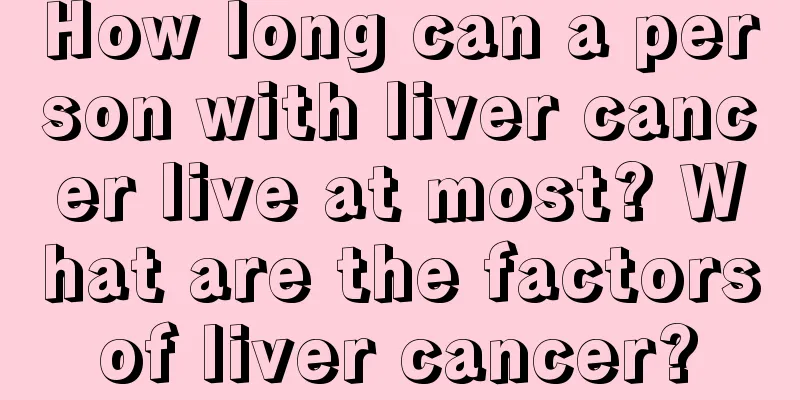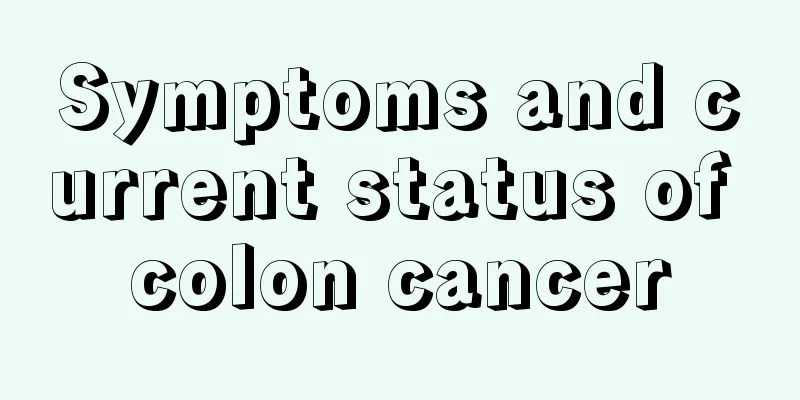Which men should beware of prostate cancer? Good habits should be developed to prevent prostate cancer

|
With the advancement of diagnostic technology, more and more male patients are diagnosed with prostate cancer. In fact, in many cases, prostate cancer can be detected and treated early, achieving a high cure rate. But the key is how to predict it? What are the symptoms of prostate cancer? The early or late onset and severity of clinical symptoms of prostate cancer depend on the rate of cancer growth and the degree of urethral compression. 1. Abnormal urination Because the prostate encircles the urethra, cancer first compresses the urethra, showing symptoms of abnormal urination. At the beginning, frequent urination and increased nocturia may be seen; when the mass grows and compresses the urethra, the urine flow becomes thinner, urination is not smooth, and the urination process is prolonged; a small number of patients may experience urination pain, and some may even have hematuria, which should be a cause of concern. As the tumor grows, the urethra is compressed more severely, making urination difficult. This causes urine to accumulate in the bladder, which becomes full and swollen, and even highly inflated. This is extremely uncomfortable and requires catheterization, and the urine that is discharged is often pungent and unpleasant. 2. Pain When prostate cancer metastasizes, especially to the pelvis, low back pain or symptoms similar to sciatica may occur, and the pain often radiates to the perineum and around the anus. Therefore, any man over the age of 45 who experiences frequent urination, increased nocturia, prolonged urination, thinner urine flow, or difficulty urinating should consider the possibility of prostate cancer. Four good habits to prevent prostate cancer in men 1. Stay away from alcohol Alcohol has a strong stimulating effect on the prostate, causing the blood vessels in the prostate to dilate, causing congestion and edema. Long-term drinking can reduce the resistance of the prostate, facilitate the growth and reproduction of prostate-resident bacteria, and induce acute and chronic prostatitis. Long-term chronic inflammatory stimulation will increase the risk of cancer. 2. Moderate sex life Excessive sexual intercourse or masturbation can damage the prostate. For example, newly married men are prone to prostatitis, which is often related to excessive sexual intercourse leading to excessive congestion of the prostate. On the contrary, long-term abstinence, which results in no outlet for sexual impulses, is also bad for the prostate. Therefore, men should learn to have regular sex and discharge prostatic fluid regularly. 3. Drink plenty of water and urinate frequently Water is the source of life. Due to the busy work, sometimes it is common to not drink a sip of water for half a day. Little do people know that not drinking water will inevitably make the urine concentrated and the number of urinations will decrease. In addition, some people have the habit of holding urine, which will further increase the concentration of urine and even cause urine reflux, which is very bad for the prostate. Therefore, you should drink more water and urinate frequently, which is good for the health of the prostate. 4. Moderate exercise The physiological position of the prostate determines that men "sit" on the prostate to a large extent, so sitting for a long time can cause big problems. Men who work in offices, use computers, and drive cars should strengthen physical exercise, and also pay attention to getting up and moving around during long periods of sitting to relieve pressure on the prostate. How to prevent prostate cancer 1. Supplement vitamin E Dutch researchers found that people who took 50 mg of vitamin E orally every day for 5 to 8 years had 32% fewer symptomatic prostate cancer than those who did not take vitamin E, and the mortality rate of prostate cancer in the group taking vitamin E was 41% lower than that in the control group. It is speculated that vitamin E is a fat-soluble antioxidant that can capture excessive "killer" oxygen free radicals in the body and reduce damage to prostate cell membranes and genes, thereby preventing or delaying the occurrence of prostate cancer. Experts point out that middle-aged and elderly men should eat more foods rich in vitamin E, such as nuts (sunflower seeds, walnuts, pine nuts, pumpkin seeds, hazelnuts, etc.), wheat germ flour, hair vegetable, tofu skin, olive oil, soybean oil, corn oil, rice bran oil, sesame oil, purslane, etc. Take 50 mg or 100 mg of vitamin E capsules every day when necessary. 2. Supplement the trace element selenium Not long ago, researchers at the Harvard School of Public Health used a nail clipping method to measure the selenium intake of more than 34,000 men aged 40 to 75, and found that those with high selenium intake and low selenium intake had a significantly lower risk of prostate cancer. We know that selenium can protect the body from excessive oxygen free radical damage through glutathione peroxidase; when selenium is deficient, the biological membranes and cells of human tissues are vulnerable to attacks by oxidized fatty acids. Modern studies have shown that selenium deficiency is closely related to the occurrence of cancer. Therefore, middle-aged and elderly men should pay attention to eating more selenium-rich foods, such as razor clams, blue catfish, shrimps, mackerel, eels, roasted bran, oily gluten, etc., and if necessary, they can supplement with selenium kana gel or selenium gold health, which may have a certain effect on preventing prostate cancer. Dr. Taylor of the National Cancer Institute of the United States said: "Recent research shows that selenium and vitamin E can prevent prostate cancer. Although we cannot draw a final conclusion yet, we have reached a new and promising commanding heights." 3. Eat less meat and dairy products Recently, the Journal of the National Cancer Institute of the United States published a report on the diet of people who died of prostate cancer in 59 countries by James Hobert and others. It was found that the mortality rate of prostate cancer patients was proportional to the intake of meat, dairy products, and poultry, and inversely proportional to the intake of cereals, nuts, and fish. It suggests that people who eat too much meat and dairy products are more likely to die from prostate cancer. This is related to the fact that animal fat foods can increase the level of sex hormones in male adults and increase the risk of cancer, because prostate cancer is quite sensitive to hormone levels in the blood. |
<<: How should patients with prostate cancer match their diet
>>: What should patients with prostate cancer eat healthily
Recommend
How should thin people gain weight?
For obese people, losing weight is a painful thin...
How to solve the problem of shortness of breath in the elderly after strenuous exercise?
Many elderly people often experience shortness of...
The disadvantages of running in the morning on an empty stomach
Morning jogging is a popular and relatively healt...
What are the nursing methods for laryngeal cancer
With the improvement of medical level, the treatm...
I am afraid of getting angry when eating spicy food, but these benefits are hidden
Everyone has their own taste. Some people like to...
How to relieve chest tightness and shortness of breath in lung cancer patients? Three tips to relieve the pain of lung cancer patients
The most obvious symptom of lung cancer patients ...
Be most alert when this line appears on your finger
First, please look at your palms to see if there ...
The advantages and disadvantages of washing hair with vinegar
Many people feel that their hair quality is very ...
What exercises are suitable for brain cancer
As the number of brain cancer patients increases,...
What are the nursing measures after kidney cancer surgery?
For a disease like kidney cancer, surgery is ofte...
Can lung cancer patients eat bayberry?
Can people with lung cancer eat bayberry? 1. Lung...
Will calcium deficiency affect height?
Calcium deficiency can affect your height. Calciu...
How is Colon Cancer Diagnosed
What are the diagnostic methods for colon cancer?...
What are the disadvantages of back scraping
What are the disadvantages of scraping the back? ...
The gaps between teeth turn black
Many people have increasingly higher requirements...









